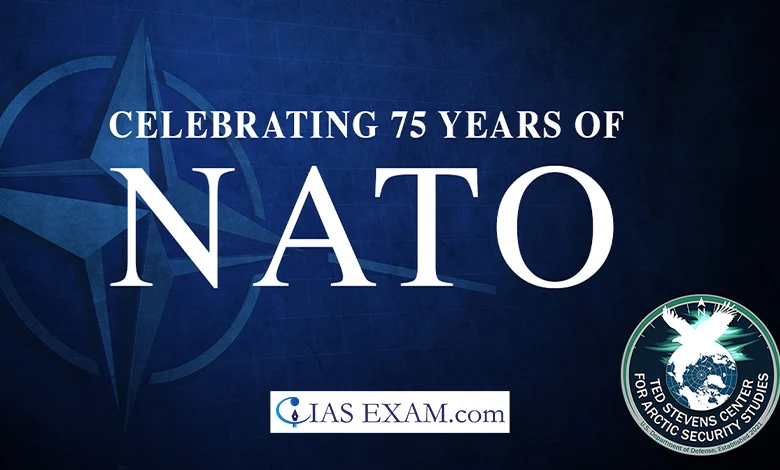Daily Current Affairs for UPSC
75 Years of Establishment of NATO
Syllabus- International Relations [GS Paper-2]

Context
NATO has recently completed its 75 years of establishment in 2024.
About
- NATO, or the North Atlantic Treaty Organization, is a navy alliance of nations.
- Establishment: It was based in 1949 with the signing of the North Atlantic Treaty, more popularly called the Washington Treaty.
- Aim: To make sure the safety and security of its member nations through collective defense.
- Founding Members: The original contributors of NATO were Belgium, Canada, Denmark, France, Iceland, Italy, Luxembourg, the Netherlands, Norway, Portugal, the UK, and the US.
- Collective Defense: The cornerstone of NATO is Article 5 of the North Atlantic Treaty, which states that an armed assault against one or more of its individuals is considered an attack against all contributors.
- Decision-Making: Decisions inside NATO are made on the idea of consensus among member countries.
- The North Atlantic Council, which incorporates the ambassadors of all member countries, is the most important political decision-making body.
- Members: It has 32 member countries, Finland and Sweden have become the thirty first and thirty second individuals respectively.
- On signing the Treaty, nations voluntarily commit themselves to collaborating inside the political consultations and military activities of the Organization.
Expansion of NATO
- NATO now has 32 members across Europe and North America, together with the UK, US, Canada, France, Germany, Italy, Spain and Turkey.
- After the Soviet Union’s collapse in 1991, many Eastern European countries joined: Albania, Bulgaria, Hungary, Poland, the Czech Republic, Slovakia, Romania, Lithuania, Latvia and Estonia.
- Sweden and Finland agreed to join in 2022, following Russia’s invasion of Ukraine. They were impartial for decades.
- Finland – which has a 1,340km (832 mile) land border with Russia – joined in 2023. Sweden became a member in March 2024.
- With Sweden and Finland joining Nato, it’s far seeing its largest enlargement since the 1990s. They will upload nearly 300,000 active and reserve troops to the alliance’s ranks.
- Ukraine, Bosnia and Herzegovina, and Georgia also hope to enroll in Nato.
Concerns of NATO Expansion
- Geopolitical Tensions: Expanding NATO’s borders doubtlessly provokes tensions with neighboring countries, particularly people with close ties to Russia.
- The immediate reason for the Russian – Ukraine war can be associated with the fact the Russia wanted to prevent Ukraine from joining NATO.
- Security Dilemma: NATO enlargement can trigger a security predicament in which one country’s attempt to beautify its protection is seen as a danger by way of any other, leading to an arms race or increased military tensions.
- Strategic Interests: Expanding NATO’s club increases questions about the strategic pursuits of the alliance and its commitment to collective defense.
- Some argue that NATO has consciousness on consolidating its present members in preference to taking up new ones.
- European Security Architecture: NATO enlargement ought to undermine efforts to develop a broader European security structure, including initiatives such as the Organization for Security and Co-operation in Europe (OSCE).
- Promoting such new alliances: Countries who see NATO as a security threat can provide a counter alliance along with the Warsaw Treaty Organization by Russia. These alliances can in addition boost up the geopolitical tensions.
- Potential for Conflict: NATO expansion increases the chance of struggle, specifically if it entails areas with current territorial disputes or unresolved conflicts.
- This should amplify tensions and increase the chance of military disagreement.
Way Ahead
- Overall, at the same time as NATO growth can decorate the security of recent member states and make contributions to the stability of the Euro-Atlantic region, it also poses various challenges and concerns that need to be carefully considered by all parties involved.
- Diplomacy, communication, and a nuanced expertise of each other’s security concerns are essential for addressing these concerns and maintaining peace and stability in the region.
Source: The Indian Express
UPSC Mains Practice Question
Q.How has NATO evolved over time to adapt to new security challenges in the Indo-Pacific region, and what is the significance of NATO in the context of Ukrain-Russia war?





.png)



